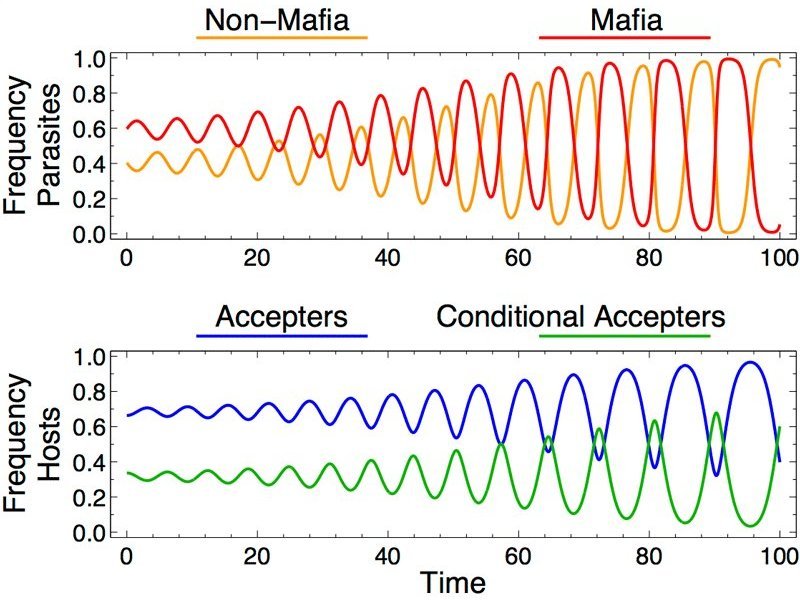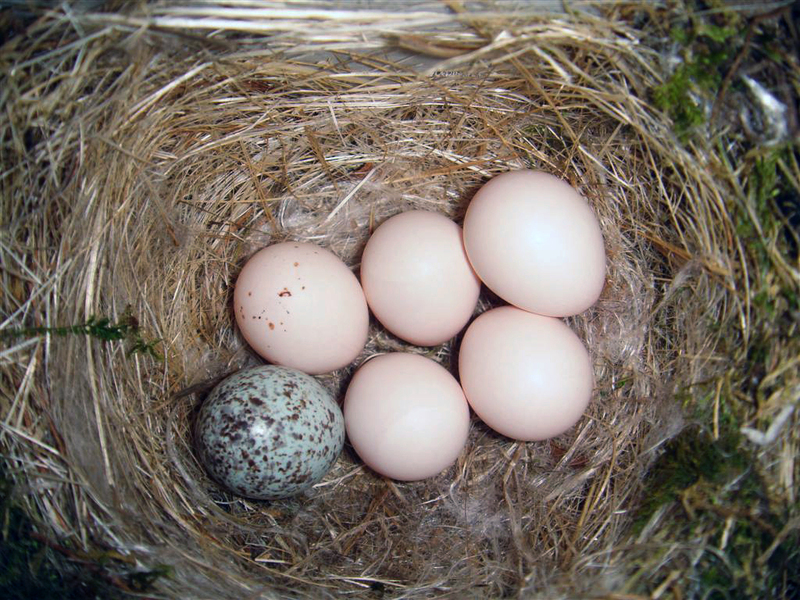It happens in the bird world too, according to a new report. A bird will lay an egg in your home and you will raise the hatchling or pay the price. Throw the little parasite out and an accident will befall your nest.
It is a child-rearing strategy, but is it an effective one? Evolutionary biologist Amotz Zahavi postulated the mafia hypothesis back in 1979 and it has been contentious ever since. Critics argue that the retaliation gives the parasites no advantage, carrying high costs instead.
Evolutionary biologists created a mathematical model to find out.

Theoretical frequency of mafia behavior in a population (simple model with one egg per season). Mafia-like parasites (above) appear cyclically more and less frequently. Similarly, the frequency of host birds (below) which accept a foreign egg immediately or only after their eggs have been destroyed varies (conditional accepters). © Scientific Reports
Some parasitic birds, such as the North American brown-headed cowbird (Molothrus ater), are observed to punish host birds by destroying their clutches if their eggs are rejected. Consequently, the hosts accept a certain degree of parasitism as long as they can raise their own offspring alongside the parasitic chicks. “We tested and confirmed the mafia hypothesis, which was controversial among scientists,” explains Maria Abou Chakra, lead author of the study. The parasitic birds use their behavior to extort the hosts, forcing them to cooperate. “They give the hosts no choice. If they wish to avoid retaliation, they need to keep the foreign egg.”
For it to work, two things must happen: the host birds must be capable of learning and the parasites must approach the same nests more than once. If those are in place, mafia-like behavior can have the desired effect. “For the hosts, the best thing is to remove the foreign egg from their own nests. But if they encounter a retaliatory parasite that destroys their nest, it’s best to adapt and accept the parasitic egg,” says Abou Chakra.
Abou Chakra works in the Evolutionary Theory Department at the Max Planck Institute for Evolutionary Biology. In collaboration with Arne Traulsen and Harvard's Christian Hilbe, she developed mathematical models to test the mafia hypothesis. The underlying principle in their minimalistic model was that each parasite lays no more than one egg in another bird’s nest, which the host may accept or eject.
A more complex model allowed the parasites to lay several eggs, each of which could be destroyed or accepted individually.
“Biologists prefer the complex model, because it is closer to reality. But we came to the same conclusion with both models: the dynamics of the interaction between host and parasite is cyclical.”
An equilibrium is never established; instead, there are regular cycles in terms of the frequency of mafia and non-mafia parasites and hosts that accept an egg immediately or only after they have suffered retaliation. If the number of non-mafia brood parasites is high, the advantage lies with conditional accepters, hosts that leave the parasite’s egg in their nest only after their nest has been destroyed.

The cowbird is not picky when it comes to selecting its hosts: it can choose from among 140 species with quite different eggs. Although the hosts can easily recognize the foreign egg, they frequently hatch it. The cowbird uses a trick to ensure that it doesn't have to adapt its eggs to resemble those of other species. By employing retaliation measures, it forces the step-parents to accept the egg. © GalawebDesign
After all, there is little chance the parasite is a retaliator. This behavior therefore increases among host birds. And this, in turn, improves the survival rate of the mafia-like brood parasites. As soon as the latter are in the majority, it makes sense for the hosts to accept unconditionally, which, in turn, renders the mafia-like behaviour unnecessary. The cycle begins anew.
Abou Chakra sees an advantage in the mafia-like behavior itself: “We believe it helps the parasites to avoid specialization.” Birds that do not adapt the size and color of their eggs to any particular host can foist their offspring on nearly any species of bird and use their behavior to force the foster parents to raise it.
“The question is, what are the conditions under which it’s better for parasites to specialize and when does mafia-like behavior pay off?”
Citation: Maria Abou Chakra, Christian Hilbe, Arne Traulsen, 'Plastic behaviors in hosts promote the emergence of retaliatory parasites', Scientific Reports, 4 March 2014; doi:10.1038/srep04251. Source: Max-Planck-Gesellschaft






Comments